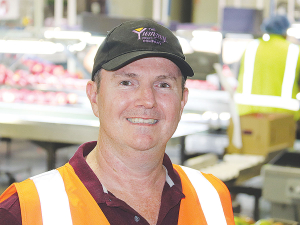Around 35% of the apple crop in Hawkes Bay could be lost as a result of Cyclone Gabrielle.
That’s the best guess of Paul Paynter of the Yummy Fruit Company, one of the region’s largest apple orcharding businesses. But he stresses this is just a guess and it’s really too early to accurately predict the loss.
Paynter describes the devastation caused by cyclone Gabrielle as the biggest economic disaster to have hit the region. He told Rural News about the carnage in the Esk Valley, in the north of region, where river levels rose seven metres above normal.
“Orchards in the Esk valley are absolutely wiped out. They are unrecognisable zombie orchards and there are trees that are not even recognisable as trees.”
The Yummy Fruit company has 53 orchards in Hawkes Bay, which meant they were able to spread the risk and, as a result, Paynter says they have got off relatively light compared with others. He says they have about 15 orchards that have gone under – some of which were in the Esk Valley.
He says they have had fruit that was stripped from trees and some trees have fallen down. Paynter believes they’ll see a production loss this season of between 25% and 30%. He says the difference between total loss and minimal damage depended on where orchards were located.
“On some of our orchards we only got about 150mm of rain, but the eastern trajectory of the cyclone meant areas in the north and east such as the Esk Valley got hit the hardest because the rainfall there was around 380mm,” he told Rural News.
“The problem was that the stopbanks on the Tutaekuri River failed and all the land between there and the Ngaruroro [River] was flooded. If the stopbanks had not failed this would have been an inconsequential event. In this case, if you were on the south side of the Ngaruroro you were largely okay.”
Paynter says, in areas between the Tutaekuri and Ngaruroro, the scene is one of devastation with not only trees destroyed but also dwellings and infrastructure such as packhouses. He says there are packhouses that won’t be able to pack any fruit this season.
He adds that some wineries have either been wiped out or severely damaged.
“Some of the land has been covered in silt and is so badly damaged that it’s unlikely to be suitable for horticulture in the future.”
Wet Feet
Apples, like other crops, need oxygen but the thick layer of silt and water around many of the trees is starving them of it.
An identical situation existed in the Bay of Plenty during recent floods.
Paynter says the low lying orchards where there is still surface water will test the resilience of the trees.
“It will be an interesting experiment to see how long they survive,” he says.
“Definitely there are going to be tree losses. We have never had water like this in the orchard just before harvest, so we are not quite sure how the trees will perform. Normally we get water around the trees in the middle of winter and dormant trees are different.”
Paynter says as temperatures rise, the trees will likely flag and die quickly and they will also be vulnerable to other soil diseases.
Harvest
Paul Paynter says the harvest had already started in Hawkes Bay, with about 9,000 bins picked of the popular Royal Gala variety on his property alone.
This has now stopped as staff have to focus on trying to clear the sludge away from the orchards so that picking can resume. He says if they don’t get rid of the sludge, in a few weeks’ time this could turn to dust and create even bigger problems.
“At the moment it’s a sludge fest it could soon become a dust bowl,” he says.
Yummy Fruit employ a number of RSE workers and while the rules say they can only be used for picking fruit, Paynter says his are helping to get the orchard back up for picking, which they regard as normal work.
“I don’t think MSD are going to come down with a heavy hand on that because we are doing the best thing for our crop and our industry in good faith,” he says.
But the labour needs of the Hawkes Bay have now changed. There will be less fruit to pick, but the backpackers who were scheduled to do this work may not come there due to the floods. Paynter says it’s still too early to know what the labour demand might be. He says there will be a slight delay with the harvest now until the orchards are cleared and then it can begin.
Paynter has some words of advice for the Government. He says it’s important for the regional economy based on orchards and vineyards to be retained to create employment and export income.
“Unless the Government comes to the party with some sort of economic development package, which I think should be on fairly commercial terms, a lot of things won’t get planted,” he told Rural News.



















